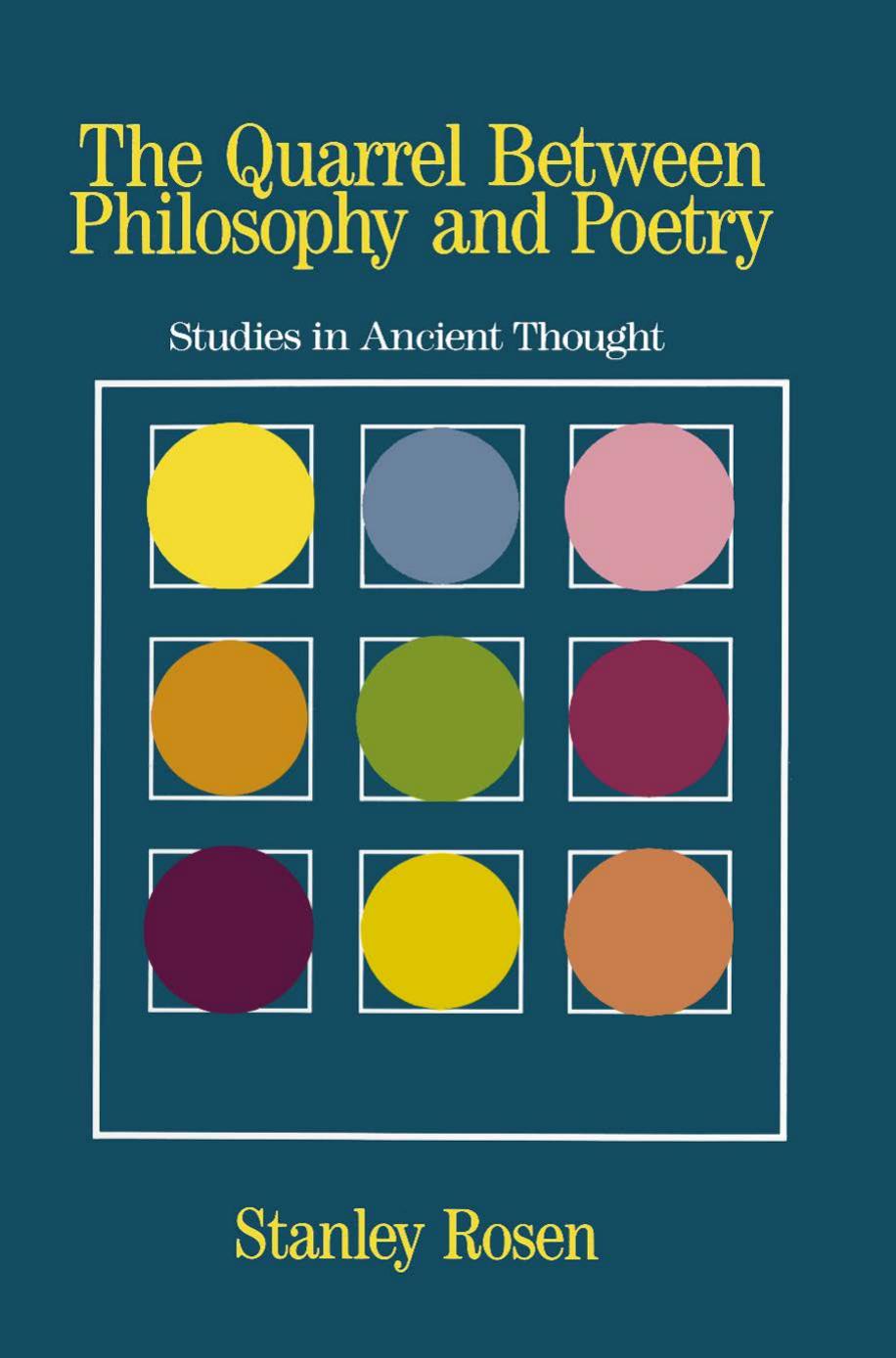The Quarrel Between Philosophy and Poetry by Rosen Stanley

Author:Rosen, Stanley
Language: eng
Format: epub, pdf
ISBN: 9781317960805
Publisher: Taylor and Francis
7
Thought and Touch: A Note on Aristotle’s De Anima
In the history of philosophy, it would be difficult to discover an effort to explain the nature of thought which does not make some fundamental analogy between the processes of thinking and sense-perception. This is as true in the case of “metaphysicians,” “idealists,” and “mystics” as it is of “materialists” or “empiricists.”1 Even where such an analogy is not explicitly made (if only to be subsequently revised in purely intellectual terms), it seems to be possible to infer it from the terms and concepts employed by whatever philosopher we may be considering. The capacity whereby “thought thinks itself” without recourse to analogies, terms, and concepts drawn from sense-perception, seems to be restricted either to God or nous (the god of the philosophers). Every human effort to transcend (whether partially or altogether) the body is conditioned, to one degree or another, by its corporeal beginning. This condition is exhibited in the fact that words or phrases employed both by philosophical and ordinary speech to designate the processes of thinking, are largely derived from the three senses of sight, hearing, and touch. We may notice two radical examples. (1) The man of faith sees manifestations or revelations of God; or he hears God’s words, directly, or in the voices of prophets. (2) The man of logic is faithful to a procedure, the name of which is derived from legein: speech as the instrument of logic is related etymologically to “collecting” or “gathering together,” the most obvious meaning of which is dependent upon the sense of touch. Thus Kant, for instance, in the Critique of Pure Reason, “gathers together” the particulars made accessible through Anschauung and synthesizes them into wholes (and the relations of wholes) by the interaction of Anschauung with the transcendental imagination. The Kantian “gathering together,” whereby the know-able world is “made,” would seem to be a mixture, or synthesis, of activities explicable primarily by seeing and touching. The categories must “embrace” their schemata, they must “touch” the particulars in order to subsume them, just as the particulars must be touched or embraced by the forms of space and time. On the other hand, the transcendental ego must “see” the particulars as they are grasped by the forms of perception, it must “see” the subsumption or synthesis of particulars by categories, and it must “see” the relationship between categories in the act of judgment.
Whatever the proper interpretation of Kant, it is fruitful to inquire whether one may generally differentiate philosophical analyses of thought according as they give precedence to one of the three senses of sight, hearing, or touch. One might then go on to determine the pervasive consequences of choosing one sense rather than another as of essential importance to an account of thinking. Among the great Greek philosophers, it seems at first glance that, in terms of this criterion, they divide into two camps: first, the empiricists, materialists, and scientists, for whom touch predominates; and the “metaphysicians” (a word which must
Download
The Quarrel Between Philosophy and Poetry by Rosen Stanley.pdf
This site does not store any files on its server. We only index and link to content provided by other sites. Please contact the content providers to delete copyright contents if any and email us, we'll remove relevant links or contents immediately.
The remains of the day by Kazuo Ishiguro(8961)
Tools of Titans by Timothy Ferriss(8359)
Giovanni's Room by James Baldwin(7313)
The Black Swan by Nassim Nicholas Taleb(7097)
Inner Engineering: A Yogi's Guide to Joy by Sadhguru(6782)
The Way of Zen by Alan W. Watts(6589)
Asking the Right Questions: A Guide to Critical Thinking by M. Neil Browne & Stuart M. Keeley(5751)
The Power of Now: A Guide to Spiritual Enlightenment by Eckhart Tolle(5741)
The Six Wives Of Henry VIII (WOMEN IN HISTORY) by Fraser Antonia(5493)
Astrophysics for People in a Hurry by Neil DeGrasse Tyson(5172)
Housekeeping by Marilynne Robinson(4432)
12 Rules for Life by Jordan B. Peterson(4298)
Double Down (Diary of a Wimpy Kid Book 11) by Jeff Kinney(4257)
The Ethical Slut by Janet W. Hardy(4235)
Skin in the Game by Nassim Nicholas Taleb(4231)
Ikigai by Héctor García & Francesc Miralles(4228)
The Art of Happiness by The Dalai Lama(4118)
Skin in the Game: Hidden Asymmetries in Daily Life by Nassim Nicholas Taleb(3985)
Walking by Henry David Thoreau(3948)
